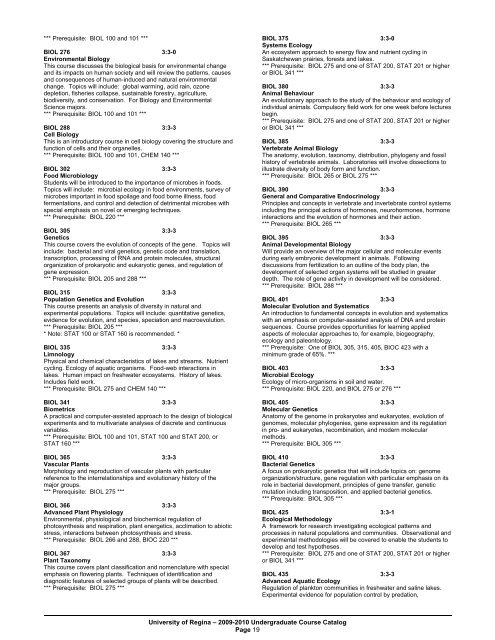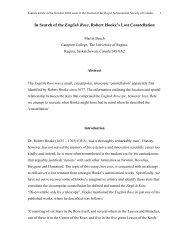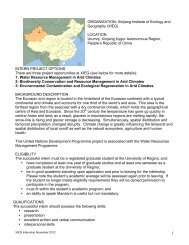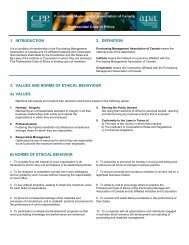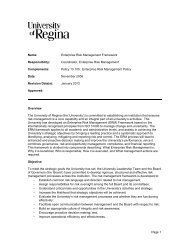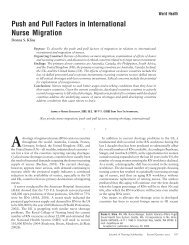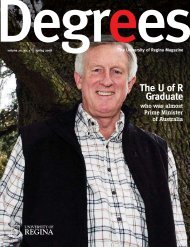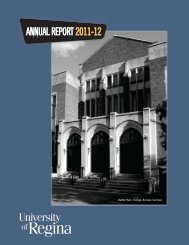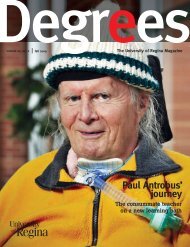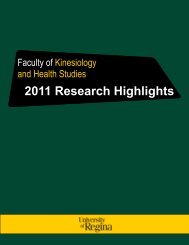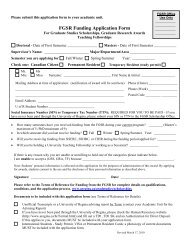2009-2010 Undergraduate Course Catalog - University of Regina
2009-2010 Undergraduate Course Catalog - University of Regina
2009-2010 Undergraduate Course Catalog - University of Regina
Create successful ePaper yourself
Turn your PDF publications into a flip-book with our unique Google optimized e-Paper software.
*** Prerequisite: BIOL 100 and 101 ***<br />
BIOL 276 3:3-0<br />
Environmental Biology<br />
This course discusses the biological basis for environmental change<br />
and its impacts on human society and will review the patterns, causes<br />
and consequences <strong>of</strong> human-induced and natural environmental<br />
change. Topics will include: global warming, acid rain, ozone<br />
depletion, fisheries collapse, sustainable forestry, agriculture,<br />
biodiversity, and conservation. For Biology and Environmental<br />
Science majors.<br />
*** Prerequisite: BIOL 100 and 101 ***<br />
BIOL 288 3:3-3<br />
Cell Biology<br />
This is an introductory course in cell biology covering the structure and<br />
function <strong>of</strong> cells and their organelles.<br />
*** Prerequisite: BIOL 100 and 101, CHEM 140 ***<br />
BIOL 302 3:3-3<br />
Food Microbiology<br />
Students will be introduced to the importance <strong>of</strong> microbes in foods.<br />
Topics will include: microbial ecology in food environments, survey <strong>of</strong><br />
microbes important in food spoilage and food borne illness, food<br />
fermentations, and control and detection <strong>of</strong> detrimental microbes with<br />
special emphasis on novel or emerging techniques.<br />
*** Prerequisite: BIOL 220 ***<br />
BIOL 305 3:3-3<br />
Genetics<br />
This course covers the evolution <strong>of</strong> concepts <strong>of</strong> the gene. Topics will<br />
include: bacterial and viral genetics, genetic code and translation,<br />
transcription, processing <strong>of</strong> RNA and protein molecules, structural<br />
organization <strong>of</strong> prokaryotic and eukaryotic genes, and regulation <strong>of</strong><br />
gene expression.<br />
*** Prerequisite: BIOL 205 and 288 ***<br />
BIOL 315 3:3-3<br />
Population Genetics and Evolution<br />
This course presents an analysis <strong>of</strong> diversity in natural and<br />
experimental populations. Topics will include: quantitative genetics,<br />
evidence for evolution, and species, speciation and macroevolution.<br />
*** Prerequisite: BIOL 205 ***<br />
* Note: STAT 100 or STAT 160 is recommended. *<br />
BIOL 335 3:3-3<br />
Limnology<br />
Physical and chemical characteristics <strong>of</strong> lakes and streams. Nutrient<br />
cycling. Ecology <strong>of</strong> aquatic organisms. Food-web interactions in<br />
lakes. Human impact on freshwater ecosystems. History <strong>of</strong> lakes.<br />
Includes field work.<br />
*** Prerequisite: BIOL 275 and CHEM 140 ***<br />
BIOL 341 3:3-3<br />
Biometrics<br />
A practical and computer-assisted approach to the design <strong>of</strong> biological<br />
experiments and to multivariate analyses <strong>of</strong> discrete and continuous<br />
variables.<br />
*** Prerequisite: BIOL 100 and 101, STAT 100 and STAT 200, or<br />
STAT 160 ***<br />
BIOL 365 3:3-3<br />
Vascular Plants<br />
Morphology and reproduction <strong>of</strong> vascular plants with particular<br />
reference to the interrelationships and evolutionary history <strong>of</strong> the<br />
major groups.<br />
*** Prerequisite: BIOL 275 ***<br />
BIOL 366 3:3-3<br />
Advanced Plant Physiology<br />
Environmental, physiological and biochemical regulation <strong>of</strong><br />
photosynthesis and respiration, plant energetics, acclimation to abiotic<br />
stress, interactions between photosynthesis and stress.<br />
*** Prerequisite: BIOL 266 and 288, BIOC 220 ***<br />
BIOL 367 3:3-3<br />
Plant Taxonomy<br />
This course covers plant classification and nomenclature with special<br />
emphasis on flowering plants. Techniques <strong>of</strong> identification and<br />
diagnostic features <strong>of</strong> selected groups <strong>of</strong> plants will be described.<br />
*** Prerequisite: BIOL 275 ***<br />
BIOL 375 3:3-0<br />
Systems Ecology<br />
An ecosystem approach to energy flow and nutrient cycling in<br />
Saskatchewan prairies, forests and lakes.<br />
*** Prerequisite: BIOL 275 and one <strong>of</strong> STAT 200, STAT 201 or higher<br />
or BIOL 341 ***<br />
BIOL 380 3:3-3<br />
Animal Behaviour<br />
An evolutionary approach to the study <strong>of</strong> the behaviour and ecology <strong>of</strong><br />
individual animals. Compulsory field work for one week before lectures<br />
begin.<br />
*** Prerequisite: BIOL 275 and one <strong>of</strong> STAT 200, STAT 201 or higher<br />
or BIOL 341 ***<br />
BIOL 385 3:3-3<br />
Vertebrate Animal Biology<br />
The anatomy, evolution, taxonomy, distribution, phylogeny and fossil<br />
history <strong>of</strong> vertebrate animals. Laboratories will involve dissections to<br />
illustrate diversity <strong>of</strong> body form and function.<br />
*** Prerequisite: BIOL 265 or BIOL 275 ***<br />
BIOL 390 3:3-3<br />
General and Comparative Endocrinology<br />
Principles and concepts in vertebrate and invertebrate control systems<br />
including the principal actions <strong>of</strong> hormones, neurohormones, hormone<br />
interactions and the evolution <strong>of</strong> hormones and their action.<br />
*** Prerequisite: BIOL 265 ***<br />
BIOL 395 3:3-3<br />
Animal Developmental Biology<br />
Will provide an overview <strong>of</strong> the major cellular and molecular events<br />
during early embryonic development in animals. Following<br />
discussions from fertilization to an outline <strong>of</strong> the body plan, the<br />
development <strong>of</strong> selected organ systems will be studied in greater<br />
depth. The role <strong>of</strong> gene activity in development will be considered.<br />
*** Prerequisite: BIOL 288 ***<br />
BIOL 401 3:3-3<br />
Molecular Evolution and Systematics<br />
An introduction to fundamental concepts in evolution and systematics<br />
with an emphasis on computer-assisted analysis <strong>of</strong> DNA and protein<br />
sequences. <strong>Course</strong> provides opportunities for learning applied<br />
aspects <strong>of</strong> molecular approaches to, for example, biogeography,<br />
ecology and paleontology.<br />
*** Prerequisite: One <strong>of</strong> BIOL 305, 315, 405, BIOC 423 with a<br />
minimum grade <strong>of</strong> 65%. ***<br />
BIOL 403 3:3-3<br />
Microbial Ecology<br />
Ecology <strong>of</strong> micro-organisms in soil and water.<br />
*** Prerequisite: BIOL 220, and BIOL 275 or 276 ***<br />
BIOL 405 3:3-3<br />
Molecular Genetics<br />
Anatomy <strong>of</strong> the genome in prokaryotes and eukaryotes, evolution <strong>of</strong><br />
genomes, molecular phylogenies, gene expression and its regulation<br />
in pro- and eukaryotes, recombination, and modern molecular<br />
methods.<br />
*** Prerequisite: BIOL 305 ***<br />
BIOL 410 3:3-3<br />
Bacterial Genetics<br />
A focus on prokaryotic genetics that will include topics on: genome<br />
organization/structure, gene regulation with particular emphasis on its<br />
role in bacterial development, principles <strong>of</strong> gene transfer, genetic<br />
mutation including transposition, and applied bacterial genetics.<br />
*** Prerequisite: BIOL 305 ***<br />
BIOL 425 3:3-1<br />
Ecological Methodology<br />
A framework for research investigating ecological patterns and<br />
processes in natural populations and communities. Observational and<br />
experimental methodologies will be covered to enable the students to<br />
develop and test hypotheses.<br />
*** Prerequisite: BIOL 275 and one <strong>of</strong> STAT 200, STAT 201 or higher<br />
or BIOL 341 ***<br />
BIOL 435 3:3-3<br />
Advanced Aquatic Ecology<br />
Regulation <strong>of</strong> plankton communities in freshwater and saline lakes.<br />
Experimental evidence for population control by predation,<br />
<strong>University</strong> <strong>of</strong> <strong>Regina</strong> – <strong>2009</strong>-<strong>2010</strong> <strong>Undergraduate</strong> <strong>Course</strong> <strong>Catalog</strong><br />
Page 19


